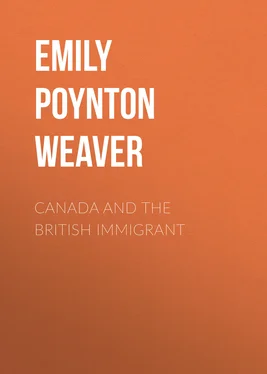Emily Poynton Weaver - Canada and the British immigrant
Здесь есть возможность читать онлайн «Emily Poynton Weaver - Canada and the British immigrant» — ознакомительный отрывок электронной книги совершенно бесплатно, а после прочтения отрывка купить полную версию. В некоторых случаях можно слушать аудио, скачать через торрент в формате fb2 и присутствует краткое содержание. Жанр: Путешествия и география, История, foreign_edu, foreign_antique, foreign_prose, на английском языке. Описание произведения, (предисловие) а так же отзывы посетителей доступны на портале библиотеки ЛибКат.
- Название:Canada and the British immigrant
- Автор:
- Жанр:
- Год:неизвестен
- ISBN:нет данных
- Рейтинг книги:3 / 5. Голосов: 1
-
Избранное:Добавить в избранное
- Отзывы:
-
Ваша оценка:
- 60
- 1
- 2
- 3
- 4
- 5
Canada and the British immigrant: краткое содержание, описание и аннотация
Предлагаем к чтению аннотацию, описание, краткое содержание или предисловие (зависит от того, что написал сам автор книги «Canada and the British immigrant»). Если вы не нашли необходимую информацию о книге — напишите в комментариях, мы постараемся отыскать её.
Canada and the British immigrant — читать онлайн ознакомительный отрывок
Ниже представлен текст книги, разбитый по страницам. Система сохранения места последней прочитанной страницы, позволяет с удобством читать онлайн бесплатно книгу «Canada and the British immigrant», без необходимости каждый раз заново искать на чём Вы остановились. Поставьте закладку, и сможете в любой момент перейти на страницу, на которой закончили чтение.
Интервал:
Закладка:
The matters put under the control of the provinces are:—The amendment of the provincial constitutions (except as to the lieutenant-governor); direct taxation and borrowing of money on the provincial credit for provincial purposes; provincial officials; management and sale of provincial public lands and forests; regulation of asylums, hospitals, charities, reformatories and jails; municipal institutions; shop, tavern and other licences; solemnization of marriage; property and civil rights; constitution and maintenance of provincial courts of civil and criminal jurisdiction; the appointment of magistrates and justices of the peace; education, with certain exceptions as to the separate schools of religious minorities; and local works and matters of a merely private nature in a province.
With regard to immigration and agriculture, both Dominion and provincial parliaments may legislate, but in case of conflicting legislation the Dominion Act overrules the provincial. The Governor-in-Council of the Dominion may disallow an Act of a provincial parliament, within one year of its passing, and the Imperial government in like manner may disallow an Act passed by the Dominion parliament within two years after its receipt by the Secretary of State for the Colonies; but the power of disallowance is used very rarely. If an Act passed by the Dominion or a provincial parliament exceeds, as sometimes happens, the powers given under the British North America Act, the courts may declare it ultra vires —that is, “beyond the powers” of the legislature which enacted it. The provinces may neither organize nor maintain a provincial military force; and here again the constitution of Canada differs from that of the United States, under which each State may have a military force.
The revenue of the Dominion is obtained from taxation (largely in the form of duties on imported goods), “from receipts from the sales of the crown lands, from the post office, from railways, canals and other sources.” Upon their entrance into confederation each of the provinces resigned its right to levy indirect taxes; and in place of this each province receives a subsidy from the Dominion.
The Dominion at the time of Confederation took over the public debts of the several provinces; and further debts have been incurred in the building of canals, railways, and other public works. To set against these the Dominion possesses immensely valuable assets in her millions of acres of ungranted lands and in her state-owned railways, canals, and public buildings for various purposes.
Since Confederation the provinces have also incurred public debts, largely in constructing works to improve communication, and in the erection of public buildings.
The capital of the Dominion is the city of Ottawa, beautifully situated on the right bank, or Ontario side, of the Ottawa river, which forms a considerable part of the boundary between the provinces of Quebec and Ontario.
Ottawa was founded by a gallant English officer, Colonel John By, after whom the original little village built at the point where the Rideau river falls into the Ottawa, was called Bytown. The name—quaintly suggestive of the Pilgrim’s Progress —would not have been as euphonious a title for the metropolis of the Dominion as is Ottawa; but one cannot help regretting that this tribute to By should have been swept from the map, for he certainly deserves remembrance. He came to Canada in 1802, when he had just reached manhood, and was stationed for nine years in the picturesque old capital of Quebec. He was recalled to serve in the Peninsular war, but in the spring of 1826 received orders to go again to Canada to superintend the construction of the Rideau canal. The experiences of the war of 1812 had made the authorities desirous to open another route for the transportation of troops and supplies to the upper country than that by the St. Lawrence, which was much at the mercy of the Americans, and so it was decided to construct a system of canals and dams and locks to connect and improve the natural waterways and give communication between the Ottawa river and Kingston on Lake Ontario.
The task was a difficult one. The country was then scarcely inhabited, and the work had to be carried through tracts of swamp and morass, where the surveyors and workmen frequently contracted fever and ague; but By refused to be discouraged. For six years his stalwart, soldierly figure, often mounted on a coal-black charger, was a familiar sight in the mushroom village which sprang up on the southern bank of the Ottawa or Grand river.
Besides civilian workmen, he had at his command a company of sappers and miners, a fact recalled to-day by the name of the “Sappers’ Bridge” at Ottawa; and traditions still linger of his perseverance, his determination to accept no scamped work, and his kindness of heart. One all but completed dam went down before an ice-jam, and a new bridge was swept away by a spring flood; but the indomitable colonel took these disasters merely as a challenge to build more strongly, and at last the whole waterway, one hundred and twenty-six miles in length, with its twenty-four dams and its forty-seven locks, was open for navigation.
In the same year the colonel was called home, not to receive praise and honour for his achievement, but to serve, it has been said, as “a scapegoat” for the government, which had been attacked for spending public moneys without the authority of parliament. The blow was crushing, and falling into “low spirits,” the gallant gentleman could no longer triumph over misfortunes, but died a few months later in his fifty-third year.
But Bytown prospered. Till the St. Lawrence canals were completed the whole trade between Upper and Lower Canada passed through the rough little village, and to visitors it seemed that Bytown folk were too busy to pave their streets or to think of gardens or flowers. The Upper and Lower towns on either side of the hill, then crowned by the barracks, now by the parliament buildings, were separate villages. Then, as now, it was a great lumbering centre, and there were wild doings when gangs of lumber-jacks came down from the woods for business or pleasure. Whiskey was deplorably cheap, and the woodsmen often fought savagely amongst themselves, or with the Irish “shiners” who rafted the lumber down the river; and sometimes they made “felonious assault” on unoffending citizens. But despite the rude accompaniments of the lumber trade, it was building up Bytown, which was incorporated as a town with six thousand inhabitants fifteen years after the completion of the Rideau canal. Eight years later it became a city, and changed its name to Ottawa.
In the fifties, there was an inconvenient arrangement, by which the cities of Toronto and Quebec served alternately for four years each as capital of Upper and Lower Canada (then united), but in 1857 Queen Victoria was asked to name a permanent capital. On account of its central position with regard to the two provinces, its distance from the international boundary line; and above all, perhaps, because of descriptions which she had heard of the striking beauty of its site, Her Majesty made choice of Ottawa. The erection of the beautiful parliament buildings was soon afterwards begun, and at Confederation the city became the capital of the Dominion, whilst the rank of provincial capital was restored to the larger city of Toronto.
Ottawa, with its suburbs, now has about one hundred and twenty-five thousand people and its chief interests are still lumber and legislation. A little army of its breadwinners finds employment, in some capacity or other, in connection with the business of government. Each of the departments of state has, of course, a large staff, from experts of various descriptions down to clerks and office boys.
The official residence of the Governor-General is Rideau Hall. This long, low, rambling erection is hardly picturesque, though it is decidedly old-fashioned. It stands in pleasant grounds, and its nucleus, “the Castle,” as it was called, was built in 1838, by a Scottish member of parliament, named McKay. The original house had a score of rooms, but the present-day Hall has over a hundred, which have been added from time to time to suit the convenience of its noble occupants. For instance, the great ballroom dates from Lord Dufferin’s time; while the racquet court was built by the Marquis of Lorne, a studio by the artistic Marchioness, and the chapel by the Earl of Aberdeen.
Читать дальшеИнтервал:
Закладка:
Похожие книги на «Canada and the British immigrant»
Представляем Вашему вниманию похожие книги на «Canada and the British immigrant» списком для выбора. Мы отобрали схожую по названию и смыслу литературу в надежде предоставить читателям больше вариантов отыскать новые, интересные, ещё непрочитанные произведения.
Обсуждение, отзывы о книге «Canada and the British immigrant» и просто собственные мнения читателей. Оставьте ваши комментарии, напишите, что Вы думаете о произведении, его смысле или главных героях. Укажите что конкретно понравилось, а что нет, и почему Вы так считаете.


![О Генри - Граф и свадебный гость [Черное платье] [The Count and the Wedding Guest]](/books/405331/o-genri-graf-i-svadebnyj-gost-chernoe-plate-th-thumb.webp)









